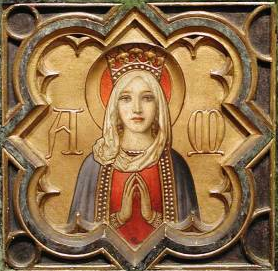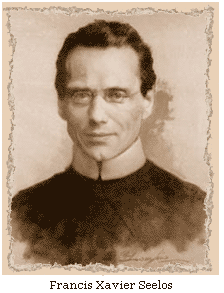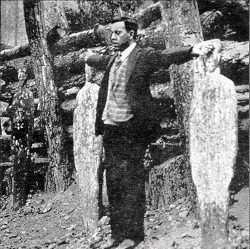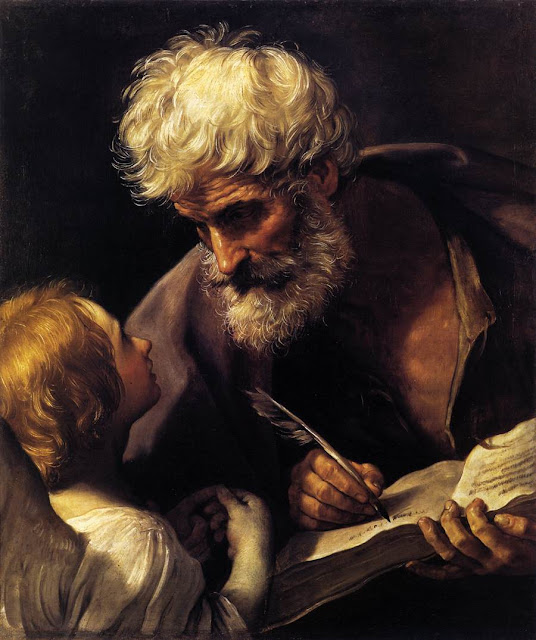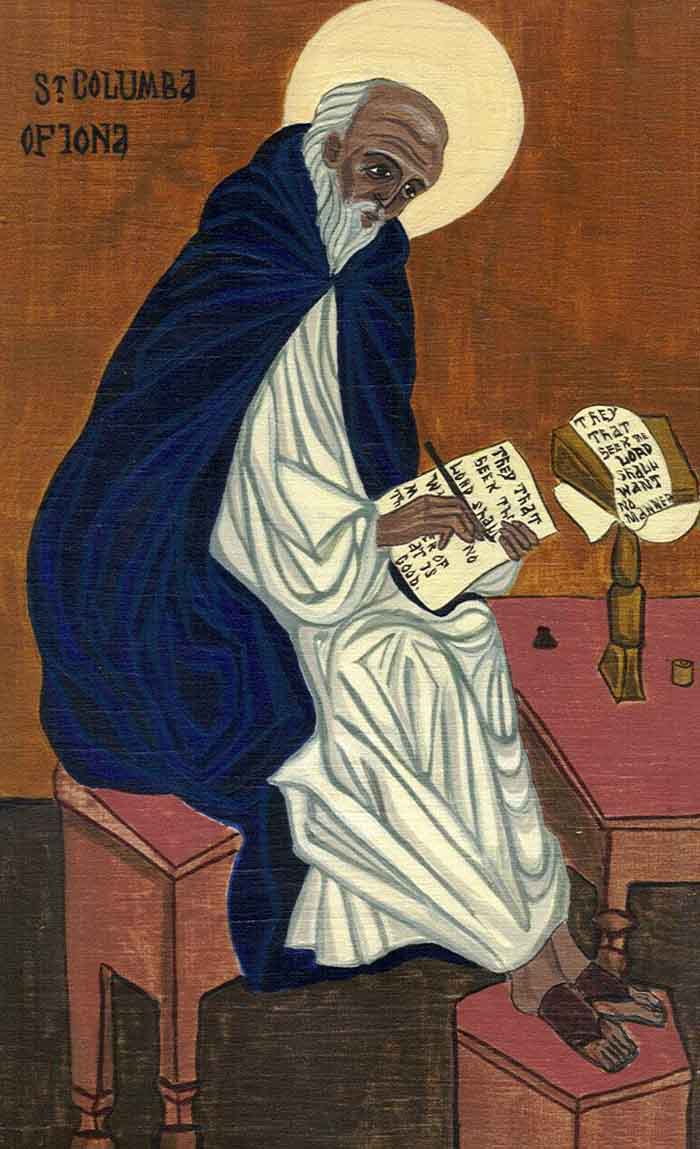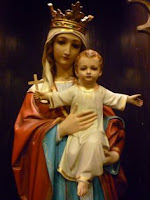+
 |
| A contemporary icon of Underhill |
Anglican Archbishop of Canterbury Michael Ramsey stated that from 1921 onward Evelyn Underhill became a Doctor of the Church. In her life's work and her personal spiritual life she moved from Plotinian Neo-Platonism to Christocentric Worship as the proper expression and meaning of the spiritual life. Her life can be separated into three periods. The first was filled with mystical experiences outside of any institutional Church. The second period can be seen in relationship to her interest in Roman Catholicism. The third period saw her become and active Anglo-Catholic within the Church of England who was greatly influenced by members of the Eastern Orthodox churches. Her two masterworks Mysticism and Worship have been required reading in Anglican and Roman Catholic seminaries for many generations.
Notably at the time of her death a Greek Orthodox bishop and an Anglican bishop saw her body shine with an heavenly light. Among the Eastern Orthodox this is a miraculous sign and witness from God that this person was a true and great Saint.
The excerpt below must be seen as coming before that critical year 1921 in which the development of her understanding of Christian Worship and the meaning of Christian Prayer began to come to fruition. Nevertheless, there is much to be gained from this period in her life when she was drawing out the inner mysteries of the mystical experience and presenting them in ways that people of her time could comprehend. Today some of her phrases and expressions of popular culture are lost on us. In the first paragraph below a reader today may be left scratching one's head in puzzlement. Do not let that stop you. Read on.
+ + +
"The pure soul is like a lens from which all irrelevancies ... have been removed."
Evelyn Underhill writes:
Has it never happened to you to lose yourself for a moment in a swift and satisfying experience for which you found no name? When the world took on a strangeness, and you rushed out to meet it, in a mood at once exultant and ashamed? Was there not an instant when you took the lady who now orders your dinner into your arms, and she suddenly interpreted to you the whole of the universe? a universe so great, charged with so terrible an intensity, that you have hardly dared to think of it since. Do you remember that horrid moment at the concert, when you became wholly unaware of your comfortable seven-and-sixpenny seat? Those were onsets of involuntary contemplation; sudden partings of the conceptual veil. Dare you call them the least significant moments of your life? Did you not then, like the African saint, "thrill with love and dread," though you were not provided with a label for that which you adored?
It will not help you to speak of these experiences as "mere emotion." Mere emotion then inducted you into a world which you recognised as more valid — in the highest sense, more rational — than that in which you usually dwell: a world which had a wholeness, a meaning, which exceeded the sum of its parts. Mere emotion then brought you to your knees, made you at once proud and humble, showed you your place. It simplified and unified existence: it stripped off the little accidents and ornaments which perpetually deflect our vagrant attention, and gathered up the whole being of you into one state, which felt and knew a Reality that your intelligence could not comprehend. Such an emotion is the driving power of spirit, an august and ultimate thing: and this your innermost inhabitant felt it to be, whilst your eyes were open to the light.
Now that simplifying act, which is the preliminary of all mystical experience, that gathering of the scattered bits of personality into the one which is really you —into the "unity of your spirit," as the mystics say — the great forces of love, beauty, wonder, grief, may do for you now and again. These lift you perforce from the consideration of the details to the contemplation of the All : turn you from the tidy world of image to the ineffable world of fact. But they are fleeting and ungovernable experiences, descending with dreadful violence on the soul. Are you willing that your participation in Reality shall depend wholly on these incalculable visitations: on the sudden wind and rain that wash your windows, and let in the vision of the landscape at your gates? You can, if you like, keep those windows clear. You can, if you choose to turn your attention that way, learn to look out of them. These are the two great phases in the education of every contemplative: and they are called in the language of the mystics the purification of the senses and the purification of the will.
"The pure soul is like a lens from which all irrelevancies ... have been removed."
Those who are so fortunate as to experience in one of its many forms the crisis which is called "conversion" are seized, as it seems to them, by some power stronger than themselves and turned perforce in the right direction. They find that this irresistible power has cleansed the windows of their homely coat of grime; and they look out, literally, upon a new heaven and new earth. The long quiet work of adjustment which others must undertake before any certitude rewards them is for these concentrated into one violent shattering and rearranging of the self, which can now begin its true career of correspondence with the Reality it has perceived. To persons of this type I do not address myself: but rather to the ordinary plodding scholar of life, who must reach the same goal by a more gradual road.
What is it that smears the windows of the senses? Thought, convention, self-interest. We throw a mist of thought between ourselves and the external world: and through this we discern, as in a glass darkly, that which we have arranged to see. We see it in the way in which our neighbours see it; sometimes through a pink veil, sometimes through a grey. Religion, indigestion, priggishness, or discontent may drape the panes. The prismatic colours of a fashionable school of art may stain them. Inevitably, too, we see the narrow world our windows show us, not "in itself," but in relation to our own needs, moods, and preferences; which exercise a selective control upon those few aspects of the whole which penetrate to the field of consciousness and dictate the order in which we arrange them, for the universe of the natural man is strictly egocentric. We continue to name the living creatures with all the placid assurance of Adam: and whatsoever we call them, that is the name thereof. Unless we happen to be artists — and then but rarely — we never know the "thing seen in its purity; never, from birth to death, look at it with disinterested eyes. Our vision and understanding of it are governed by all that we bring with us, and mix with it, to form an amalgam with which the mind can deal. To "purify" the senses is to release them, so far as human beings may, from the tyranny of egocentric judgments; to make of them the organs of direct perception. This means that we must crush our deep-seated passion for classification and correspondences; ignore the instinctive, selfish question, "What does it mean to me?"; learn to dip ourselves in the universe at our gates, and know it, not from without by comprehension, but from within by self-mergence.
Richard of St. Victor has said, that the essence of all purification is self-simplification; the doing away of the unnecessary and unreal, the tangles and complications of consciousness: and we must remember that when these masters of the spiritual life speak of purity, they have in their minds no thin, abstract notion of a rule of conduct stripped of all colour and compounded chiefly of refusals, such as a more modern, more arid asceticism set up. Their purity is an affirmative state; something strong, clean, and crystalline, capable of a wholeness of adjustment to the wholeness of a God-inhabited world. The pure soul is like a lens from which all irrelevancies and excrescences, all the beams and motes of egotism and prejudice, have been removed; so that it may reflect a clear image of the one Transcendent Fact within which all other facts are held.
"All which I took from thee I did but take,
Not for thy harms,
But just that thou might'st seek it in My arms."
But you, practical man, have lived all your days amongst the illusions of multiplicity. Though you are using at every instant your innate tendency to synthesis and simplification, since this alone creates the semblance of order in your universe — though what you call seeing and hearing are themselves great unifying acts — yet your attention to life has been deliberately adjusted to a world of frittered values and prismatic refracted lights: full of incompatible interests, of people, principles, things. Ambitions and affections, tastes and prejudices, are fighting for your attention. Your poor, worried consciousness flies to and from amongst them; it has become a restless and a complicated thing. At this very moment your thoughts are buzzing like a swarm of bees. The reduction of this fevered complex to a unity appears to be a task beyond all human power. Yet the situation is not as hopeless for you as it seems. All this is only happening upon the periphery of the mind, where it touches and reacts to the world of appearance. At the centre there is a stillness which even you are not able to break. There, the rhythm of your duration is one with the rhythm of the Universal Life. There, your essential self exists: the permanent being which persists through and behind the flow and change of your conscious states. You have been snatched to that centre once or twice. Turn your consciousness inward to it deliberately. Retreat to that point whence all the various lines of your activities flow, and to which at last they must return. Since this alone of all that you call your "selfhood" is possessed of eternal reality, it is surely a counsel of prudence to acquaint yourself with its peculiarities and its powers. "Take your seat within the heart of the thousand-petaled lotus," cries the Eastern visionary. "Hold thou to thy Centre," says his Christian brother, "and all things shall be thine." This is a practical recipe, not a pious exhortation.
 |
| Evelyn Underhill |
So then, man, in the person of his greatest and most living representatives, feels himself to have implicit correspondences with three levels of existence; which we may call the Natural, the Spiritual, and the Divine. The road on which he is to travel therefore, the mystical education which he is to undertake, shall successively unite him with these three worlds; stretching his consciousness to the point at which he finds them first as three, and at last as One.
He already possesses, at that gathering point of personality which the old writers sometimes called the "apex" and sometimes the "ground" of the soul, a medium of communication with Reality. But this spiritual principle, this gathering point of his selfhood, is just that aspect of him which is furthest removed from the active surface consciousness. He treats it as the busy citizen treats his national monuments. It is there, it is important, a possession which adds dignity to his existence; but he never has time to go in. Yet as the purified sense, cleansed of prejudice and self-interest, can give us fleeting communications from the actual broken-up world of duration at our gates: so the purified and educated will can wholly withdraw the self's attention from its usual concentration on small useful aspects of the time-world, refuse to react to its perpetually incoming messages, retreat to the unity of its spirit, and there make itself ready for messages from another plane. This is the process which the mystics call Recollection: the first stage in the training of the contemplative consciousness.
We begin, therefore, to see that the task of union with Reality will involve certain stages of preparation as well as stages of attainment; and these stages of preparation — for some disinterested souls easy and rapid, for others long and full of pain — may be grouped under two heads. First, the disciplining and simplifying of the attention, which is the essence of Recollection. Next, the disciplining and simplifying of the affections and will, the orientation of the heart; which is sometimes called by the formidable name of Purgation. So the practical mysticism of the plain man will best be grasped by him as a five-fold scheme of training and growth: in which the first two stages prepare the self for union with Reality, and the last three unite it successively with the World of Becoming, the World of Being, and finally with that Ultimate Fact which the philosopher calls the Absolute and the religious mystic calls God.
On the Catholic Channel of the Patheos website an excellent article by Carl McColman about Evelyn Underhill appeared in March of 2017: LINK
+ + +
On the Catholic Channel of the Patheos website an excellent article by Carl McColman about Evelyn Underhill appeared in March of 2017: LINK

